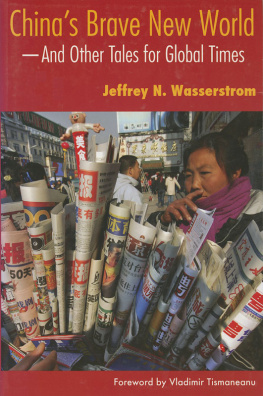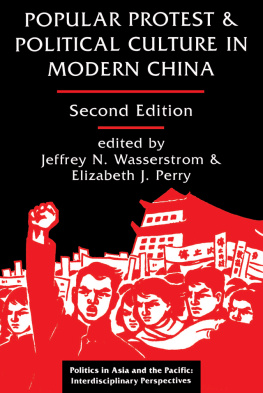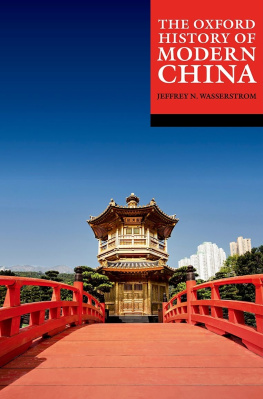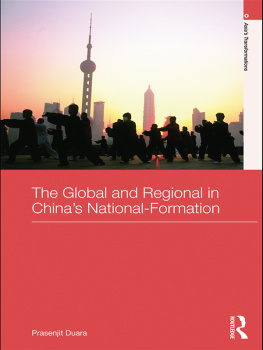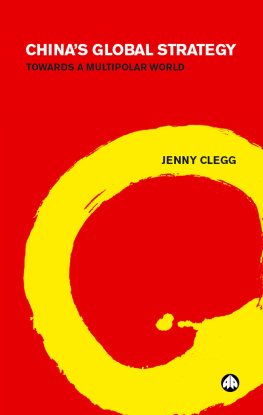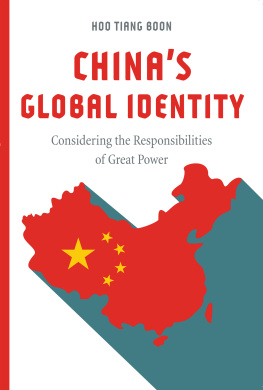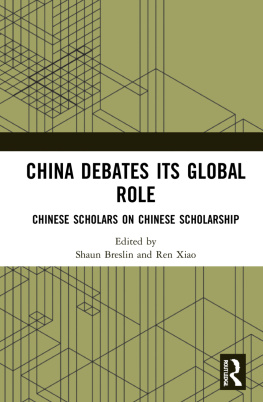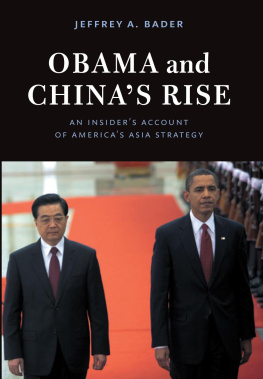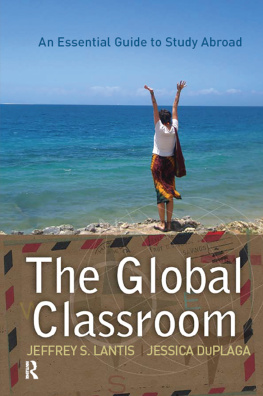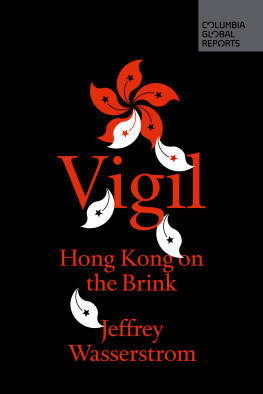This book is a publication of
Indiana University Press
601 North Morton Street
Bloomington, IN 474043797 USA
http://iupress.indiana.edu
Telephone orders 800-842-6796
Fax orders 812-855-7931
Orders by e-mail iuporder@indiana.edu
2007 by Jeffrey N. Wasserstrom
All rights reserved
No part of this book may be reproduced or utilized in any form or by any means, electronic or mechanical, including photocopying and recording, or by any information storage and retrieval system, without permission in writing from the publisher. The Association of American University Presses Resolution on Permissions constitutes the only exception to this prohibition.
The paper used in this publication meets the minimum requirements of American National Standard for Information SciencesPermanence of Paper for Printed Library Materials, ANSI Z39.481984.
Manufactured in the United States of America
Library of Congress Cataloging-in-Publication Data
Wasserstrom, Jeffrey N.
Chinas brave new world: and other tales for global times / Jeffrey N.
Wasserstrom; foreword by Vladimir Tismaneanu.
p. cm.
Includes bibliographical references and index.
ISBN 9780-253348890 (cloth: alk. paper)ISBN 9780-253219084 (pbk.: alk. paper)
1. ChinaCivilization19762002. 2. ChinaCivilization-2002 3. Civilization, Modern1950- I. Title. II. Title: And other tales for global times.
DS779.23.W38 2007
951.06dc22
2006035028
1 2 3 4 5 12 11 10 09 08 07
Contents
Foreword: Beyond Marx, Lenin, and Mao Vladimir Tismaneanu
Introduction
PART ONE Adventures in China-Watching
Burgers, Beepers, and Bowling Alleys
Mr. Mao Ringtones
All the Coffee in China
The Generalissimo Would Not Be Amused
PART TWO The Inscrutable West
Searching the Stars for Emily Hahn
Traveling with Twain
Around the World with Grant and Li
The Time Machine of Tippecanoe County
PART THREE Turn-of-the-Century Flashbacks
Mixed Emotions: China in 1999
Karl Gets a New Cap: Budapest in 2000
Patriotism in Public Life: The United States in 2001
A San Francisco of the East: Hong Kong in 2002
PART FOUR The Tomorrowland Diaries
Chinas Brave New World
Chicago in an Age of Illusions
Why Go Anywhere?
Faster than a Speeding Bullet Train
Afterword: Rhymes for Our Times
Acknowledgments
Bibliography of Works Discussed
Index
Jeffrey Wasserstrom is not only an insightful historian, but also an active public intellectual. The essays collected in this volume propose a very personal, provocative, erudite, and morally compelling approach to Chinas ongoing Great Transformation. Im not a China expert, but I read them with enormous interest. What Wasserstrom does is show us how the old mythologies, long cherished by Chinese communists, have become increasingly obsolete.
True, much of the old system is still there, at least at the symbolic level. Institutionally, the Communist Party still exerts full control. For all the thousands of internet cafs, Starbucks, and modern bookstores, there is still a scarcity of open debate on the countrys recent past. Discussing Maos real biography or assessing the Cultural Revolution remains taboo. Some of the recent Western writings on Mao may be exaggerated, but it is hard to separate him from some of the worst human rights abuses of the past century. In one of the best essays, Wasserstrom imagines what Maos reactions would be were he to come back to life and witness the immense changes, especially in the economy, social structure (the rise of the new bourgeoisie, encouraged by the party/state), and culture. I agree that much would terrify and outrage the once-worshipped Great Helmsman. Still, as Wasserstrom correctly points out, he would be happy that the country is still run by the Leninist (or, more accurately, Maoist) party, and that ideology, exhausted as it is, still enjoys an unquestioned monopoly. Or, better said, whenever someone questions this monopoly, the person suffers immediately the consequences, including marginalization, harassment, imprisonment, or expulsion (depending on how serious the transgression is deemed by the regime). Market Leninism, as some authors describe contemporary China, is based on the attempt to reconcile ideology-driven authoritarianism with the restoration and cultivation of private property. For Lenin and Mao, no doubt, such a mixture would have been the ultimate apostasy.
For years, East European dissidents have focused on changes in the Peoples Republic of China. For people like Adam Michnik, Jacek Kuron, Vaclav Havel, and Miklos Haraszti, China has always mattered. The Tiananmen protests, and the June 4th Massacre that crushed them, were major parts of the series of events that resulted in the breakdown of communism in East-Central Europe. Wasserstrom explains the nature of the Chinese upheaval of 1989 and shows that Western media tended to focus on certain visible symbols, ignoring or downplaying the complexities of the story. The Goddess of Democracy was more than an expression of admiration for American-style democracy. Workers, as much as students, were involved in the movement.
This is a lucidly optimistic book. Wasserstrom has studied the East European transitions and realizes how important the role of critical intellectuals was in developing civil society initiatives. The most successful transitions occurred in countries where such intellectuals and civil societies managed to act decisively. On the other hand, nationalism was also a corrosive force, and Wasserstroms discussion of the many faces of Chinese nationalism is truly illuminating.
How peaceful will be Chinas exit from authoritarianism? Can we expect this to happen in the near future? Can modernity be reduced to technological progress? How long can the appeals of freedom be suppressed? Wasserstroms book comes out at the right moment: fifty years ago, in OctoberNovember 1956, the Hungarian intellectuals, many former convinced Marxists, led a popular uprising in favor of pluralism and freedom. The revolution was crushed by Soviet tanks. Mao was among those who most intensely and decisively pushed Nikita Khrushchev to organize the military action against the Hungarian legal government and its supporters. Half a century later, Hungary is a free country, and the statues of the former leaders have been amassed in a special park that Wasserstrom describes with wry irony. Reading this book, we can anticipate that one day such a park may well exist in Beijing or Shanghai.
Vladimir Tismaneanu
Washington, D.C.
May 10, 2006
Questions about Chinas recent past and future prospects are currently high on the agenda of intellectually curious members of the American reading public, one of the main audiences for which this book is intended. They are also of steadily growing interest to others who may be drawn to a work with the phrase tales for global times in its title, such as instructors who teach and students who take classes in international studies. And questions about the Peoples Republic of China (PRC) are likely to loom larger still in the coming months and years, thanks to the media frenzy sure to accompany the lead-up to and staging of two mega-events. One of these events is, of course, the 2008 Beijing Olympics, already the subject of intense debate (over whether holding the Games in China is justified, given the regimes human rights record) and speculation (over such things as how many medals PRC athletes will win and how Zhang Yimou, the acclaimed director, will choreograph the opening ceremonies).

